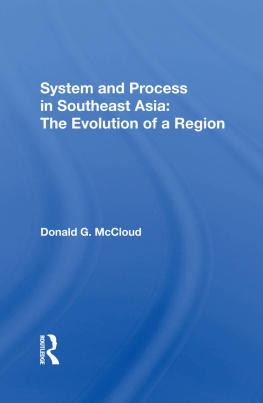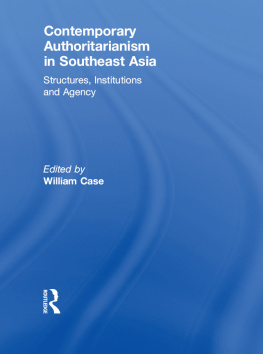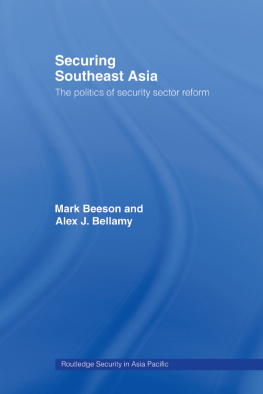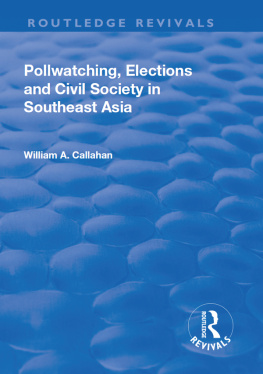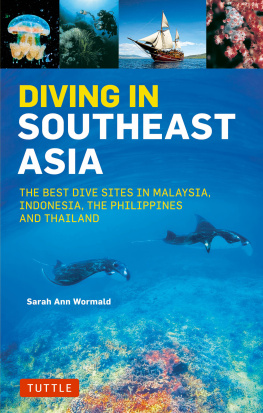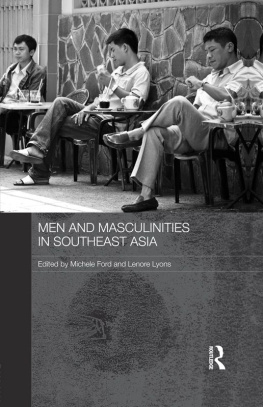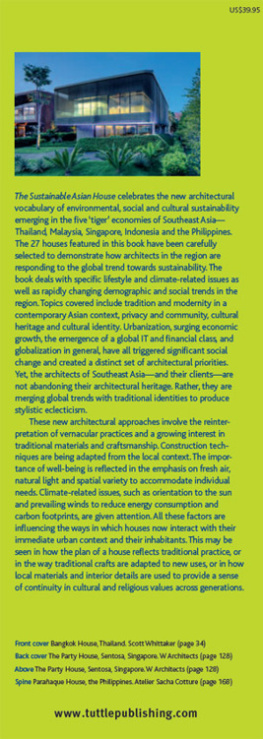System and Process in Southeast Asia
About the Book and Author
Southeast Asia, although not garnering the headlines of ten to twenty years ago, is important in global politics. Vietnam's domination of Indochina, for example, has polarized the region, given the Soviet Union new regional access, and magnified the military threat to Thailand. Insurgency movements supported by the radical Left or Right continue to plague governments. The Strait of Malacca, the major sea-lane through Southeast Asia, provides primary access for the U.S. Pacific fleet to the Indian Ocean and the Middle East and is Japan's oil lifeline. U.S. commercial and military interests remain strong in the Philippines and are expanding in Indonesia, the world's fifth largest country (with a population approaching 170 million people), whereas Thailand, Malaysia, and Singapore are sources for investment, raw materials, and potential markets. Thailand, once closely allied with the United States, has again renewed those ties in the face of Vietnam's expansion.
This comprehensive, up-to-date textbook analyzes Southeast Asia in the context of regional and global political systems, both traditional and contemporary. After looking at the traditional patterns of interstate relations in the region, Professor McCloud shows that Southeast Asia has been and continues to be dependent on the global system. However, he also identifies a "neotraditional current" in contemporary Southeast Asian politics, as elements of traditional beliefs and values reassert themselves in policy and practice, redefine the patterns of interstate behavior in the region, and set the limits to dependence on the global system.
The book is intended as a primary text for courses on the history or politics of Asia or Southeast Asia, regional development and integration, and the role of Southeast Asia in world politics. It will also be useful in survey courses in Asian studies, comparative politics, and Third World development.
Donald G. McCloud is the associate executive director of the Midwest Universities Consortium for International Activities (MUCIA). He also holds an adjunct appointment in the department of political science at the Ohio State University.
in memoriam Jean G. McCloud
Donald G. McCloud
System and Process in Southeast Asia: The Evolution of a Region
First published 1986 by Westview Press, Inc.
Published 2019 by Routledge
52 Vanderbilt Avenue, New York, NY 10017
2 Park Square, Milton Park, Abingdon, Oxon OX14 4RN
Routledge is an imprint of the Taylor & Francis Group, an informa business
Copyright 1986 Taylor & Francis
All rights reserved. No part of this book may be reprinted or reproduced or utilised in any form or by any electronic, mechanical, or other means, now known or hereafter invented, including photocopying and recording, or in any information storage or retrieval system, without permission in writing from the publishers.
Notice:
Product or corporate names may be trademarks or registered trademarks, and are used only for identification and explanation without intent to infringe.
Library of Congress Cataloging in Publication Data
McCloud, Donald G.
System and process in Southeast Asia
1. Asia, Southeastern--Politics and government. 2. Regionalism--Asia, Southeastern. I. Title.
DS526.7.M38 1986 959'.05 85-26574
ISBN 0-86531-587-6
ISBN 0-86531-588-4 (pbk.)
British Library Cataloguing in Publication Data
McCloud, Donald G.
System and process in South East Asia: The evolution of a region.
1. Asia, South Eastern--Politics and government
I. Title
320'.959 JQ96.A2
ISBN 13: 978-0-367-28938-6 (hbk)
The thoughts and ideas presented in this book have evolved over a long period of time. The process began in the late 1960s during my graduate training and has continued ever since, paralleling the general pattern of thought among other Southeast Asian scholars. The project required such a long period for completion partly because of the slow developments in the field and partly because duties prevented me from focusing fully on research and writing. My approach to the subject was greatly influenced by Richard L. Walker and Donald E. Weatherbee. The intellectual debt that I carry from them and others at the University of South Carolina is enormous and one that I feel I seldom repay. Don Weatherbee also provided valuable criticisms for balancing the material and substance of this work.
The opportunity to participate in the Department of Political Science of The Ohio State University and the encouragement from its members, particularly R. William Liddle and Charles F. Hermann, stimulated my desire to undertake the project. For those resources not available in the libraries at Ohio State, the Southeast Asian Collection at Ohio University proved invaluable and its staff knowledgeable and supportive. The editorial staff at Westview Press has also been extremely supportive and helpful, even at times when it appeared that the manuscript might never be completed.
My deepest appreciation goes to the Midwest Universities Consortium for International Activities (MUCIA), not only for providing for my livelihood but also for giving me the opportunity to travel frequently to Southeast Asia and to become intimately involved in development work there. The demands of program development and maintenance at MUCIA were often consuming but so too was the insistence of the executive director, William L. Flinn, that the book be finished. Without his friendship and support, as well as that of the consortium's Board of Directors and staff, this task would ultimately have been impossible. Within the executive office of the consortium, Jayne Allison worked tirelessly preparing the early drafts, revisions, and versions using different formats; Mark Simpson assisted greatly with documentation and citations; John Biefeldt carefully edited the first complete version of the manuscript; and Donald R. Walker and Dorothy Shanfeld rescued the entire project when, at the last minute, all of the manuscript had to be retyped into a new word - processing system. Their efforts are sincerely appreciated.
The actual preparation of the manuscript began in 1982, and since that time my family has endured with a husband and father who appeared to be working at two full-time positions. The patience of Carol, Laura, and Grant in listening to the phrase "I'm writing" has kept family life somewhere near normal.
Despite the kindness and efforts of so many on my behalf, clearly the errors and shortcomings of this work are my responsibility.
Donald G, MaCloud
Columbus, Ohio
Chapter 1
Southeast Asia in Regional and Global Contexts
Different people think of Southeast Asia in different ways. Mention of Thailand, Indonesia, or the Philippines, for example, often brings to mind an exotic tropical paradise of palm trees, beautiful ocean beaches, and costumed dancers. Monkeys, temples, volcanoes, and terraced rice fields are sometimes added to this travel-poster image, but names other than Bali, Manila, or perhaps Bangkok are difficult to recall. However, this image is not current. Many contrastsfor example, between the airplanes that deliver visitors to Southeast Asia and the plodding water buffalo that travelers see thereexist and confound the mind. The idealized (if not romanticized) view of traditional societies, evoking images of peace, harmony, and quiet stability based on communal village life and mutual social welfare, is now contradicted by intruding Western values of individualism, consumerism, nationalism, and other trappings of the modern world. The stereotypical travel-poster image belies a region that is rich in historical and cultural traditions, complex social structures, vigorous political, economic, and cultural growth, and increasingly confident in its prominent place in global politics.

